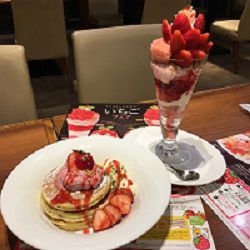
Japanese desserts
There are many traditional Japanese desserts that use local ingredients like rice and red bean paste. These include mochi and daifuku.
But there are also some western desserts that use cream and butter for example cakes and cookies.
But in this blog for Japanese learners, Japanese teacher Yuki Kamiyama introduces desserts that use fruits that are in season.
Read this interesting blog and learn new vocabulary.
Listen to the video to hear the Japanese language spoken fluently to practice Japanese listening.
フルーツパフェ
Fruit parfait

By KAMIYAMA Yuki

わたしは果物が大好きなので、毎日でも食べたいのですが、日本では果物の値段は高いです。例えばスーパーでりんごが1個150円もします。
日本人は友達の家に遊びに行くときに果物を持っていったり、大切な人へ果物を贈ったりします。果物の専門店では1個1万円のメロンや15粒で8千円のいちごなどが、きれいに包装され、桐の箱に入れられて並んでいます。それはまるで宝石を扱っているかのようです。
味、色、形にこだわった日本の果物を楽しむのにぴったりのデザートがあります。それはフルーツパフェです。フルーツパフェは背の高いグラスに果物、アイス、生クリーム、チョコレート、シリアルなどを盛り付けたデザートです。春はいちご、さくらんぼ、夏はマンゴー、メロン、桃、秋はぶどう、冬はりんごといったようにその季節ごとの旬のフルーツを楽しむことができます。見た目も華やかでとてもきれいです。
喫茶店やファミレスでも食べることができますが、果物専門店のフルーツパーラーのパフェは絶品なので特におすすめです。
To listen to this blog, please watch our Youtube video.
フルーツパフェ
わたしは果物(くだもの)が大好(だいす)きなので、毎日(まいにち)でも食(た)べたいのですが、日本(にほん)では果物(くだもの)の値段(ねだん)は高(たか)いです。例(たと)えばスーパーでりんごが1個(こ)150円(えん)もします。
日本人(にほんじん)は友達(ともだち)の家(いえ)に遊(あそ)びに行(い)くときに果物(くだもの)を持(も)っていったり、大切(たいせつ)な人(ひと)へ果物(くだもの)を贈(おく)ったりします。果物(くだもの)の専門店(せんもんてん)では1個(こ)1万円(まんえん)のメロンや15粒(つぶ)で8千円(せんえん)のいちごなどが、きれいに包装(ほうそう)され、桐の箱(きりのはこ)に入(い)れられて並(なら)んでいます。それはまるで宝石(ほうせき)を扱(あつか)っているかのようです。
味(あじ)、色(いろ)、形(かたち)にこだわった日本(にほん)の果物(くだもの)を楽(たの)しむのにぴったりのデザートがあります。それはフルーツパフェです。フルーツパフェは背(せ)の高(たか)いグラスに果物(くだもの)、アイス、生(なま)クリーム、チョコレート、シリアルなどを盛(も)り付(つ)けたデザートです。春(はる)はいちご、さくらんぼ、夏(なつ)はマンゴー、メロン、桃(もも)、秋(あき)はぶどう、冬(ふゆ)はりんごといったようにその季節(きせつ)ごとの旬(しゅん)のフルーツを楽(たの)しむことができます。見た目(みため)も華(はな)やかでとてもきれいです。
喫茶店(きっさてん)やファミレスでも食(た)べることができますが、果物(くだもの)専門店(せんもんてん)のフルーツパーラーのパフェは絶品(ぜっぴん)なので特(とく)におすすめです。
Fruit parfait
I really love fruits and would like to eat them everyday but the prices of fruit in Japan are really high. For example one apple would cost you 150 yen in the supermarket.
When Japanese people visit friends' houses, they take fruits with them and often gift fruits to important people. In fruit specialty stores, you can find single melons sold for 10,000 yen or 15 berries of strawberries sold for 8,000 yen lined up and packaged beautifully in paulownia wood boxes. They seem to be treated almost like jewelry.
There is a dessert that matches the way we enjoy Japan's fruit shapes, colors and taste. This is fruit parfait. Fruit parfait is desert with fruit in a tall glass, arranged with ice cream, cream, chocolate, cereal, etc. In spring you can find strawberries or cherries, in summer you can find mangoes, melons or peaches, in autumn you can find grapes and in winter you can apples and in this way, you can enjoy the fruits that are in season. The appearance is brilliant and looks very beautiful.
You can eat them in cafes and coffee shops and family restaurants. And the fruit parfait that you can find in the fruit parlours in specialty shops are especially superb pieces of work so I really recommend these.
専門店(せんもんてん) specialty store
包装(ほうそう) package
桐(きり)の箱(はこ) a box of paulownia wood
宝石(ほうせき) jewelry
旬(しゅん) the height of the season
華やか(はなやか) brilliant
絶品(ぜっぴん) a superb piece of work
Hajimemashite, my name is Yuki Kamiyama. I live in Tokyo with my family (husband and two children).
My hobbies are reading books and watching movies. It doesn't matter what genre, I really enjoy and get stimulated by coming into contact with worlds that I do not yet know.
Why did you decide to study Japanese ? Was it for work, or for a hobby ? Or was it travel to Japan ? I would like to stand beside you and help you realize your hopes as you state, “I want to say this in Japanese ! I want to learn !” I will support you as much as I possibly can to get you to achieve your goals.



